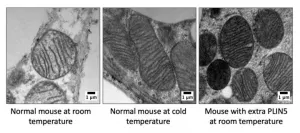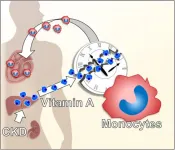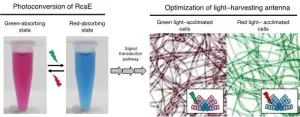(Press-News.org) Cancer researchers say they have established a new, life-extending treatment option for men with prostate cancer that has spread and become resistant to hormone therapy. The injected treatment combines a targeting compound with a radioactive isotope to irradiate and kill cancer cells.
An international clinical trial sponsored by Endocyte, Inc., a Novartis company tested the targeted radioligand therapy in study participants with advanced prostate cancer. All subjects had cancers that had spread to other organs and continued to progress after previous treatment with two kinds of drugs, androgen axis inhibitors and taxanes. The experimental treatment significantly extended survival, delayed progression and was generally well tolerated by study subjects, researchers said.
"This is a completely new treatment option that extends life and disease control in metastatic castration-resistant prostate cancer - the most aggressive and deadly type," said Tom Beer, M.D., one of the study leaders and deputy director of the Oregon Health & Science University Knight Cancer Institute.
The added option is particularly important, Beer said, because the existing most effective treatments developed for metastatic castration resistant prostate cancer are now being used to treat early-stage disease.
"Some of our best treatments are being used earlier, so by the time you get to metastatic castration resistant disease, you have fewer options," he said.
Beer is a co-author of the presentation of the results at the American Society of Clinical Oncology Annual Meeting on Sunday. The OHSU Knight Cancer Institute was among the top sites for enrolling subjects.
The experimental therapy is called Lutetium-177-PSMA-617. It carries the radioactive isotope Lutetium-177 and targets prostate-specific membrane antigen, or PSMA, a protein that appears on the surface of most prostate cancer cells. After injection into the bloodstream, the drug binds to prostate cancer cells bearing PSMA, and thus delivers radiation selectively to the cancer. The emitted beta particle radiation works over short distances to limit damage to surrounding tissues.
More than 80 percent of advanced prostate cancers bear the PSMA protein, and patients with PSMA-bearing tumors can be identified with a PET scan.
The randomized, phase 3 clinical trial enrolled more than 800 subjects at 84 sites. They were randomly assigned to receive Lutetium-177-PSMA-617 in addition to standard of care, or to receive standard of care alone. Those in the experimental therapy group received intravenous infusions of the radioligand therapy once every six weeks for up to six cycles.
Overall survival was significantly longer in those treated with the targeted radioligand: a median of 15.3 months versus 11.3 months. Survival without tumor progression also was significantly longer in the radioligand group: a median of 8.7 months versus 3.4 months.
Researchers said the effect of Lutetium-177-PSMA-617 treatment on overall survival was substantial especially given that all of the subjects enrolled had disease progressing despite treatment with modern androgen axis inhibitors and taxane chemotherapy. They said ongoing trials will address the question of whether the targeted radioligand therapy can provide therapeutic benefit earlier in the treatment sequence than was the case in the present clinical study.
The incidence of treatment-emergent adverse events of grade 3 or above was higher in the group given the targeted radioligand than in group given the standard of care only. Fatigue, dry mouth and nausea were the most commonly reported adverse events in the radioligand group.
"It's pretty well tolerated," Beer said. "I think it's going to be an asset in treating cancer without taking a big toll on patients."
INFORMATION:
The OHSU Knight Cancer Institute is a national leader in prostate cancer treatment and research, expanding access to clinical trials and the newest treatments. With the VA Portland Health Care System, the Knight Cancer Institute has established center of excellence for prostate cancer precision oncology.
Disclosure: The clinical trial was funded by Endocyte, Inc., a Novartis company. Tom Beer received research funding from Endocyte and consulting fees from Novartis.
Leesburg, VA, June 4, 2021--According to a pilot study published in ARRS' American Journal of Roentgenology (AJR), the flexed elbow valgus external rotation (FEVER) view can improve MRI evaluation of the ulnar collateral ligament (UCL) in Major League Baseball (MLB) pitchers.
"The increased joint space width confirms elbow valgus stress with FEVER view," wrote corresponding author Thomas Knoblauch at the University of Nevada Las Vegas. "Diagnostic confidence increased, and additional UCLs were identified as abnormal."
Due to repetitive extreme valgus stress during overhead throwing maneuvers, UCL injuries remain common in throwing athletes. Because standard positioning for elbow MRI ...
DALLAS - June 4, 2021 - Increasing a protein concentrated in brown fat appears to lower blood sugar, promote insulin sensitivity, and protect against fatty liver disease by remodeling white fat to a healthier state, a new study led by UT Southwestern scientists suggests. The END ...
Fukuoka, Japan--According to the Global Burden of Disease Study 2017, close to nine percent of the global population lives with some form of chronic kidney disease, or CKD. Not only does the condition affect renal function, CKD has long been associated with increased risk of cardiovascular disease.
Now, in a new study that could aid the development of therapeutic drugs to reduce these cardiac complications, researchers led by Kyushu University have found an underlying molecular pathway that can explain how chronic kidney disease induces heart failure.
Studying mice, the researchers found that a key driver is the dysfunction of a type of white blood cell called a ...
Overview:
Certain cyanobacteria can change the absorbing light colors for photosynthesis using a green- and red-light sensing photosensor protein. A Japanese research group elucidated the molecular structure of RcaE, a representative member of the photosensors. They revealed the unique conformation of the bilin chromophore and the unique protein structure that potentially functions as a proton transfer route to bilin. They also demonstrated that RcaE undergoes protonation and deprotonation of the bilin chromophore during the green and red photoconversion. These results provide insights into how cyanobacteria evolved photosensors with diverse spectral sensitivities and contribute to the development of new photoswitches of ...
Coral insights into 1,000 years of seasonal changes in the Arabian Sea warn of significant impacts caused by global warming.
Every year, the southwesterly winds of the summer monsoon sweep down the Arabian Peninsula, pushing the surface waters of the Arabian Sea away from the coast and driving an upwelling of deep waters to the surface. This rising seawater is colder and less saline than the surface water and is rich in nutrients, providing energy for the various organisms living in the Arabian Sea and Indian Ocean.
Scientists from Japan, Taiwan and Germany, including coral reef scientist Dr. Tsuyoshi Watanabe of Hokkaido University, have uncovered evidence from corals off the coast of Oman suggesting that global warming is causing changes to the Arabian Sea that could impact the ...
Delicious to some, but a bitter bane to others' taste buds, vegetables like broccoli rabe, bok choy and turnips are a dinner staple ---and picky eater conflict --- around the world.
It all likely started in the mountains near present-day Afghanistan, where humans first domesticated turnips 3,500 to 6,000 years ago, according to a new study recently published in the journal Molecular Biology and Evolution. University of Wisconsin-Madison Professor of Botany Eve Emshwiller and her former graduate student Alex McAlvay (now an assistant curator assistant ...
HOUSTON-(June 3, 2021) - Results were released this week on a new treatment with the potential to improve the outcomes for patients with hereditary BRCA mutations and high-risk, early-stage breast cancer. These results represent the first time a drug that blocks cancer cells from repairing their DNA (called a PARP inhibitor) has been shown to significantly reduce the risk of breast cancer returning in high-risk patients following completion of standard chemotherapy, surgery and radiation therapy.
Titled "Adjuvant Olaparib for Patients with BRCA1 or BRCA2 Mutated Breast Cancer," the paper appears in the June 3 issue of the ...
Could an over-the-counter health "shot" help fight COVID-19? George Mason University researchers think it just might. ...
ROCHESTER, Minn. -- A study by Mayo Clinic researchers provides some clarity in the use of direct oral anticoagulants (DOAC), such as apixaban and rivaroxaban, to treat acute venous thromboembolism (VTE) in patients with gastrointestinal cancers. The findings were published Wednesday, June 2, in Mayo Clinic Proceedings.
Among the study's findings:
Rivaroxaban showed no higher risk of bleeding in luminal gastrointestinal cancer and should not be considered contraindicated in this group of patients.
Apixaban showed a higher risk of bleeding in patients with luminal gastrointestinal cancer, and it should be used with great caution to treat this type of cancer until more studies ...
WOODS HOLE, Mass. -- Plastics are everywhere. From cell phones to pens and cars to medical devices, the modern world is full of plastic-- and plastic waste. New research from scientists at the Marine Biological Laboratory (MBL) END ...








